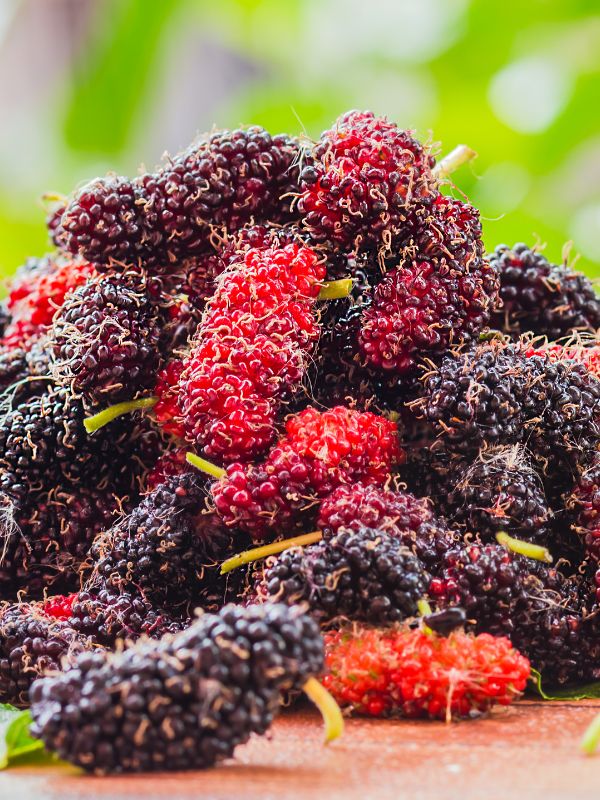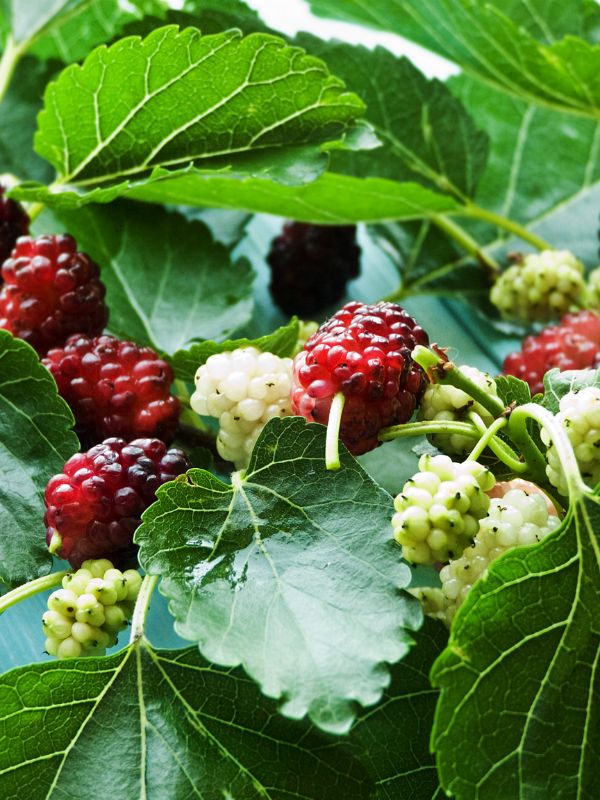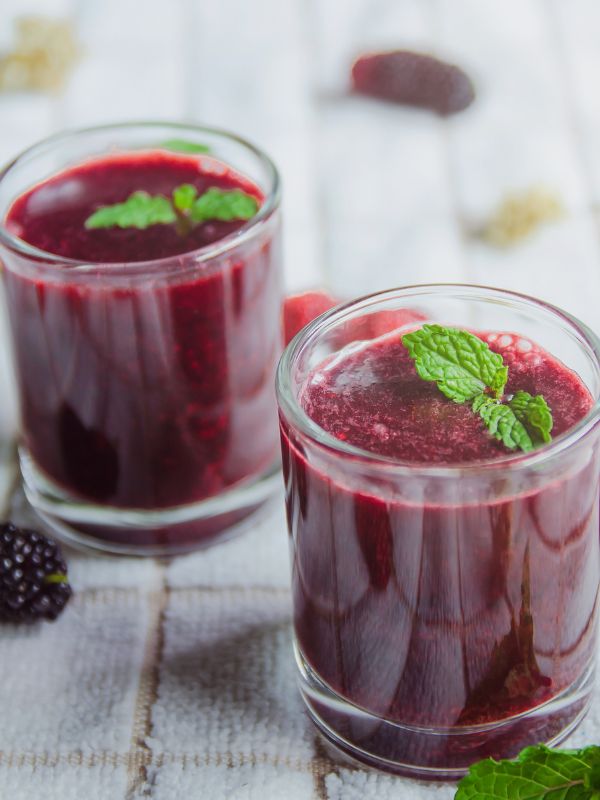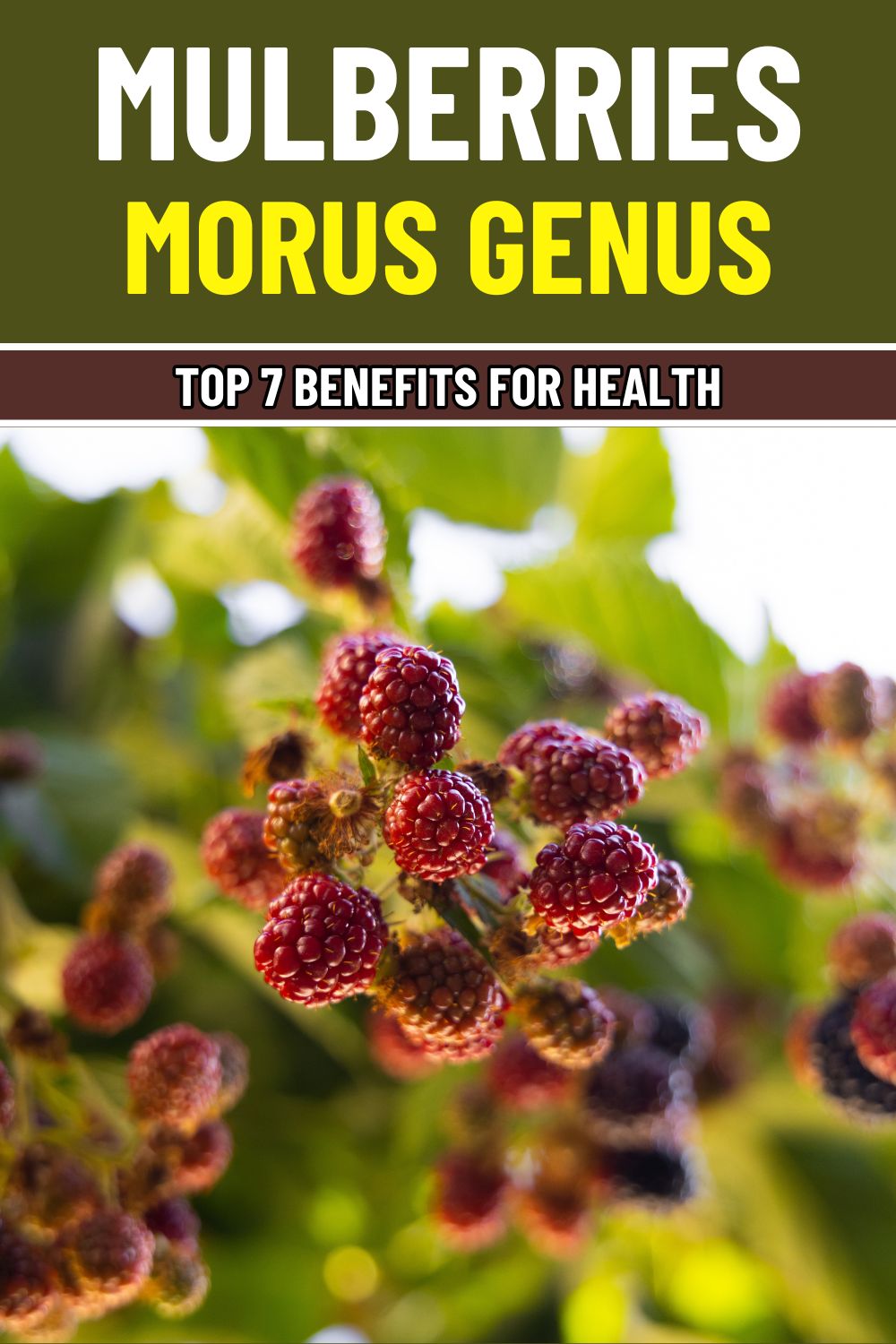Mulberries (Morus genus), small, sweet berries with a rich history in traditional medicine, have gained recognition as a nutrient-packed superfood.
Native to regions of Asia, Africa, and the Americas, these fruits are known for their vibrant color and exceptional health benefits.
#1. Potent Antioxidant Properties
Mulberries are rich in antioxidants, including resveratrol, flavonoids, and anthocyanins, which help neutralize harmful free radicals in the body.
These antioxidants reduce oxidative stress, protecting cells from damage and lowering the risk of chronic diseases like heart disease, diabetes, and certain cancers.
Resveratrol is particularly beneficial for cardiovascular health. A study published in the Journal of Nutritional Biochemistry found that resveratrol improves blood vessel health and reduces inflammation, which can decrease the risk of heart disease.

#2. Supports Heart Health
Mulberries contribute to heart health due to their high antioxidant content, particularly resveratrol and potassium.
Resveratrol improves blood vessel function, lowers blood pressure, and helps reduce cholesterol levels.
Potassium helps balance the negative effects of sodium, reducing the risk of hypertension and supporting healthy heart function.
100 grams of mulberries provide 277 mg of potassium, supporting cardiovascular health. Research in the American Heart Association Journal highlights potassium’s role in lowering blood pressure and improving heart function.

#3. Immune System Boost
The high vitamin C content in mulberries strengthens the immune system, helping the body fight off infections and illnesses.
100 grams of mulberries provide 36 mg of vitamin C, nearly 40% of the recommended daily intake. Vitamin C is essential for the production of white blood cells, which are critical for immune defense.
This vitamin is also essential for maintaining healthy skin and tissues, further supporting the body’s natural barriers against infections.

#4. Blood Sugar Regulation
Mulberries have shown potential in managing blood sugar levels, particularly due to the compound 1-deoxynojirimycin (DNJ) found in the fruit.
DNJ inhibits the digestion of carbohydrates, leading to more stable blood sugar levels, making mulberries a helpful fruit for those managing diabetes.
Some studies suggest that mulberry extract may improve insulin sensitivity. A study published in the Journal of Clinical Biochemistry and Nutrition found that mulberry extract significantly lowered post-meal blood sugar levels in diabetic rats.

#5. Anti-Inflammatory Effects
The antioxidants in mulberries, such as anthocyanins, have potent anti-inflammatory properties. Chronic inflammation is linked to many diseases, including arthritis, heart disease, and diabetes.
Regular consumption of mulberries may help reduce inflammation and improve symptoms of these chronic conditions.
According to a study published in Food & Function, anthocyanins from mulberries have shown the ability to reduce markers of inflammation in the body, supporting their use in managing inflammatory conditions.

#6. Skin Health and Anti-Aging
Mulberries’ vitamin C and antioxidants promote collagen production, essential for skin elasticity and reducing the appearance of wrinkles.
These nutrients help protect the skin from free radical damage, improving skin texture and promoting a youthful, vibrant appearance.
Regular consumption of mulberries can help combat the signs of aging and reduce oxidative stress that accelerates skin aging.

#7. Eye Health
Mulberries contain zeaxanthin, an antioxidant that plays a crucial role in protecting the eyes from oxidative stress.
Zeaxanthin helps reduce the risk of age-related macular degeneration and cataracts, both of which are common eye conditions that affect vision as you age.
A study published in Nutrients shows that antioxidants like zeaxanthin, found in mulberries, can reduce the risk of retinal diseases by protecting the eyes from UV-induced oxidative stress.

How to Incorporate Mulberries Into Your Diet
Fresh mulberries: Enjoy fresh mulberries as a snack, in salads, or as a topping for yogurt and cereal.
Dried mulberries: Add dried mulberries to trail mixes and smoothies, or use them as a healthy addition to baked goods like muffins and bread.
Mulberry jam or jelly: Make your own homemade mulberry jam to spread on toast or to add to desserts.
Mulberry smoothies and juices: Blend fresh or frozen mulberries into smoothies for a refreshing, nutrient-packed drink.
Frozen mulberries: Freeze mulberries and use them in smoothies, popsicles, or as a chilled snack.

Cautions and Precautions
While rare, some individuals may be allergic to mulberries. Start with small amounts and monitor for any signs of an allergic reaction, especially if you have known fruit allergies.
Although mulberries may help regulate blood sugar, individuals with diabetes should consult their healthcare provider before incorporating them into their routine, particularly if they are on medication for blood sugar control.
Mulberries are generally safe to eat, but it’s important to consume them in moderation to avoid potential digestive discomfort due to their high fiber content. Excessive consumption may lead to bloating or gas.
Disclaimer
This article is for educational purposes only and should not replace professional medical advice or treatment.
Always consult a healthcare provider before adding new foods or supplements to your diet, especially if you have any underlying health conditions.

Why Mulberries Should Be Part of Your Daily Diet: Top Health Benefits Explained
News
JJ Redick reacts to Luka Doncic trade for Anthony Davis
In one of the most jaw-dropping moves of the season, the NBA landscape was rocked by the blockbuster trade involving Luka Dončić and Anthony Davis—a swap that has sent ripples of excitement, disbelief, and heated discussion through the league. Among…
Anthony Davis FULL reaction to trade to Mavericks for Luka Doncic
In a blockbuster move that sent shockwaves through the NBA and left fans reeling, Anthony Davis has been traded to the Dallas Mavericks in exchange for Luka Dončić. In the immediate aftermath of the news, Davis took to the media…
Shaq reacts to Dallas Mavericks wanting Kevin Durant after Luka-AD trade 👀
In the constantly shifting world of the NBA, trade rumors and blockbuster moves are a regular part of the season’s drama. The latest twist has fans buzzing: the Dallas Mavericks have reportedly set their sights on acquiring Kevin Durant in…
Donovan Mitchell FILTHY poster dunk on Kristaps Porzingis 😳
In a game filled with high-intensity moments and jaw-dropping highlights, one play in particular has left fans and analysts buzzing about Donovan Mitchell’s latest display of athleticism. Early in the contest, with the atmosphere already charged by an evenly matched…
Joel Embiid hits go-ahead bucket vs Mavs then chats with Anthony Davis after game
In one of the most thrilling contests of the season, Joel Embiid delivered a clutch performance against the Dallas Mavericks, punctuating the game with a go-ahead bucket that sent the home crowd into a frenzy. The atmosphere in the arena…
D’Angelo Russell game winner as Nets hit two 3’s in 3 seconds to win vs Rockets 😱
In one of the most electrifying moments in recent NBA history, D’Angelo Russell delivered an unforgettable game-winner that left fans and commentators in complete awe. With the Brooklyn Nets locked in a tense battle against the Houston Rockets, the outcome…
End of content
No more pages to load











